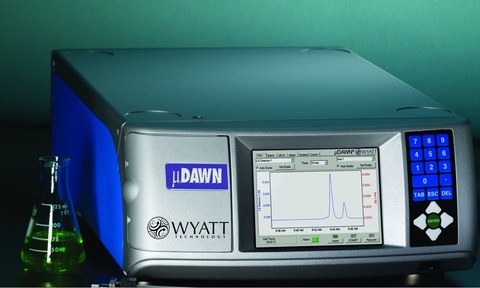
Wyatt Technology will be launching the µDAWN MALS detector at Pittcon 2014, in Chicago.
µDAWN is the world’s first multi-angle light scattering (MALS) detector that can be coupled to any UHPLC system in order to determine absolute molecular weights and sizes of polymers, peptides and proteins or other biopolymers directly, without resorting to column calibration or reference standards.
The detector connects to the Optilab UT-rEX, the first refractive index detector for UHPLC.
Refractive index detection is a critical component of any UHPLC-SEC-MALS system, so the µDAWN plus UT-rEX transfers the benefits of SEC-MALS analysis to the realm of UHPLC for the first time.
In order to accommodate the narrow peaks produced by UHPLC separation, Wyatt Technology’s engineers reduced the conventional light scattering flow cell volume from 63 µL to fewer than 10µL.
Moreover, a marked improvement was achieved in minimising interdetector mixing; the band broadening between the µDAWN MALS and Optilab UT-rEX detectors was brought to under 7 µL, while the band broadening between the UHPLC’s UV detector and the µDAWN detector is 2 µL.
As a consequence of the reduced cell volume and interdetector band broadening, a µDAWN/UT-rEX system can accurately analyse the molar mass and size of UHPLC peaks without loss of resolution.
Reduction in the cell volume of a MALS system can create significant technical difficulties due to the increased proximity of the laser beam to cell/sample interfaces.
This closeness leads to higher levels of stray light which can compromise instrument sensitivity. Innovations in the µDAWN’s detection optics and mechano-optical train not only maintain the sensitivity level but actually exceed that of Wyatt’s miniDAWN TREOS MALS detector.
Further expanding the versatility of the µDAWN is the WyattQELS Dynamic Light Scattering (DLS) module.
This embedded accessory measures DLS in the µDAWN flow cell simultaneously with MALS acquisition, computing hydrodynamic radii ’on-the-fly’.
µDAWN features a colour touchscreen front panel display which shows the chromatographic conditions as well as instrument diagnostics.



